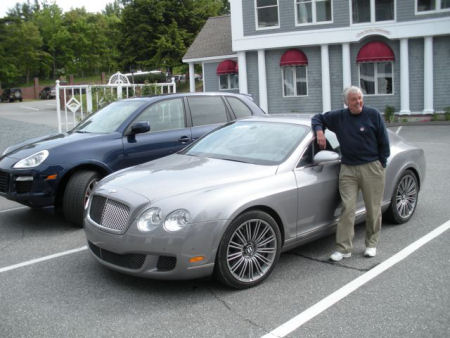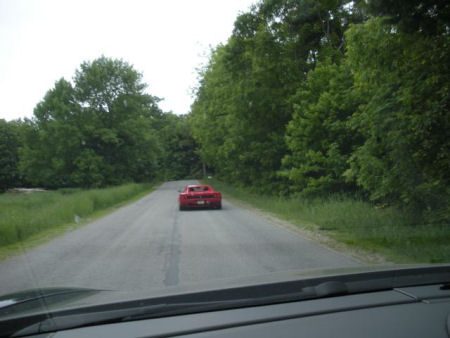The Way It Is/ Touring Maine with Brian Redman & friends
by Gordon Kirby Last week I enjoyed three salubrious days driving around Down East Maine and particularly Mount Desert Island and Acadia National Park in the company of Brian Redman and a group of classic car enthusiasts. Called 'Barnstorming Maine' the event was organized by the Maine Tourism Association and is one of a passel of classic car and historic racing events Redman helps promote each year.
Last week I enjoyed three salubrious days driving around Down East Maine and particularly Mount Desert Island and Acadia National Park in the company of Brian Redman and a group of classic car enthusiasts. Called 'Barnstorming Maine' the event was organized by the Maine Tourism Association and is one of a passel of classic car and historic racing events Redman helps promote each year.
Our train of fifteen cars covered almost 400 miles over the three days filled with plenty of sight-seeing stops. Unfortunately it rained off and on much of the time but Mount Desert Island is a beautiful place at any time of year. Much of the park was bequeathed to the nation by John D. Rockefeller and the island is rich in old-money mansions and gardens while the little towns from Bar Harbor to Northeast and Southwest Harbor are full of fine choices for breakfast, lunch and dinner.
Redman, 72, has been reluctantly retired from professional racing for twenty years. Today, Brian lives in Vero Beach and runs Intercontinental Events with his son James. In retirement Redman has remained very active in historic racing as both a driver and event organizer. His company runs Porsche's semi-annual Rennsport reunion and the Targa 66 club which meets twice a year for three days of race track performance driving.
"An event like the Rennsport, involving 400 racing Porsches, takes a huge amount of work," Redman said. "I have an army of volunteers led primarily by my son James who is the race director and does a great job.

© Gordon Kirby
Redman's Targa 66 club has been in existence for eighteen years. The idea was to have club members drive their performance cars around a racetrack for two or three days under Redman's supervision.
"We meet twice a year, at the end of February at Palm Beach International Raceway and in early October in Savannah. We charge $500 a year membership fee and if they come to an event it's $500 a day, usually for three days, and you get a huge amount of track time. We always have two or three professional drivers on hand to do instruction, but its' largely social. We don't start until 9.30 in the morning and we finish at 4.30 in the afternoon and have a jacket and tie dinner with a guest speaker on Saturday night.
"We've organized some additional two-day Targa club events at other tracks and taken groups to Goodwood and about ten years ago we took a group to the Le Mans 24 hours.
"I'm also a consultant to the Monticello Motor Club who have built a fantastic facility with a 3.5-mile road circuit in upstate New York about eighty miles from New York City. When the planning started four years ago the thinking was that there were 75,000 Porsches, Ferraris, Lamborghinis, Maseratis, Lotuses and so forth within an eighty-mile radius."
Redman also competes in historic races five or six times each year and is the grand marshal for Road America's Kohler International historic weekend in July.
"This year I'll be driving the Collier Museum Porche 908/3 at Monterey in August and doing the Goodwood hillclimb at the beginning of July in the Porsche 917PA which was Jo Siffert's original Can-Am car. I'll be driving a GT40 at Road America at the Kohler International in July and then I'll be at the Labor Day vintage weekend at Lime Rock where I don't know what I'll be driving yet. And then two weeks after that Goodwood again for the Revival meeting where I will probably run a Formula 1 Vanwall. And then the Targa 66 event at Roebling Road two weeks later."
Redman believes historic racing will continue to thrive amid today's difficult economic environment.
"I think historic and vintage racing is generally healthy," Brian observed. "Steve Earle's event at Monterey is the premier vintage racing event in North America and one of the best in the world. We're seeing small drops in attendances this year, but not huge, in the region of fifteen or twenty percent, and considering the state of the economy I think that's pretty good. We've seen this happen in the past. There have been declines but the sport has carried on and recovered."

© Gordon Kirby
"There are plenty of themes we've been able to develop but it costs money to put it on and that's tough to find," Warner remarked. "I'm sure Lord March is facing the same sponsorship problems at Goodwood that everybody is facing. These events are very expensive to put on. At least Lord March owns the property where he puts on his events.
"I posed the question in my report in last year's program. Are shows like this concours relevant in an economy that's tough? I think even when the economy gets tough we've got to celebrate our heritage. But I think that, like many things, some are just not going to survive. My goal for next year is to survive.
"I think the manufacturers have to ask the question. Does heritage marketing help them sell cars? In some cases it does. In the cases of Mercedes-Benz, Porsche and Jaguar, who have wonderful heritage in motor sports and a long heritage of manufacturing cars, it's a no-brainer. But to younger companies who wouldn't have been in the US market twenty-five years ago, they have to start telling the story of their heritage, even though it may be only twenty-five years old."
Warner believes historic racing has lost its way in America.
"I feel very strongly that vintage and historic racing have gone askew," Bill said one evening. "I'm more of a purist and I think the definition has been skewed. I think only Steve Earle has a handle on it. In my opinion the sanctioning bodes and the licencing is too lax. People with true historic cars that they value won't go out and run with most of the vintage groups because it isn't about the history of the sport anymore. It's about an easy way to go racing without having to pay your dues at the club level. Everybody wants to win and they've missed the whole meaning of what vintage racing started out to be which was a celebration of the cars."
Redman agrees. "The stable door is open and the horse has bolted," Brian said. "The problem is anybody can become a sanctioning body. There's SVRA and HSR which are part of the same group. SVRA caters to the older, more genuine cars and HSR caters to anything with wheels. It's run what you brung. You've got the VSCA, the VSCCA, me, Intercontinental Events, and maybe ten more. There are 150 vintage races each year in the United States and many smaller clubs might have only one or two races. So it's widely fragmented but judging by the number of events it's pretty healthy."
Redman also agrees with Warner that the spiralling value of some special cars has made it impossible to race them.
"As times goes by in this very fragmented world of American vintage and historic racing people are less and less willing to risk their cars," Brian commented. "There's a risk element involved, not just in racing but in transporting them as well. When you start talking about cars that are now worth $4 million or $5 million and in some cases up to $15 million of individual worth, the owner doesn't want that car out on the racetrack.
"We found this in organizing the Porsche Rennsport for Porsche Cars North America. Two years ago we had quite a lot of trouble with people who didn't want to send their great cars because of the costs in insurance and shipping. And it comes down to who pays for the insurance and shipping?

© Gordon Kirby
"The European attitude is very different," Brian added. "They race their great cars with absolute abandon as if there was a million dollars at stake for first place. But that's not the way it is in America."
I was struck during my days in Maine to hear that Redman's car enthusiast friends, many of them longtime race fans, don't much care for modern racing. Like those of us inside the sport, some of these fellows and their wives are left cold by today's spec car formula. They remain car fans forever but are race fans no more of Indy cars, NASCAR or sports cars.
Over drinks one evening Bill Warner said he was asked last year to provide a critique of the Grand-Am series. Bill has a habit of sketching cars on his dinner napkins and inevitably they are smooth, flowing shapes.
"I told them to make the cars smoother, sleeker and more individualistic," Warner said. "I told them their cars are big, ugly bricks. But they didn't want to listen to me. All they had to say was, 'What about the close racing? We have so much close racing.'
"They just don't get it that having a bunch of cars running around in a pack doesn't matter. Sports car fans want to see sleek, beautiful cars but the organizers want to make it like NASCAR and I think they're dead wrong to do that."
One evening Redman told a story about testing a contemporary Porsche RS Spyder LMP2 car at Porsche's Weissach test track in October of 2006.
"I didn't get very many laps in the RS Spyder," Brian recalled. "I had never drive a paddle shifter or traction control or ABS on a race car. But the car was beautiful to drive and it functioned perfectly. It took about one lap to learn paddle shifting because it's so easy and you can't make a mistake. I knew the brakes were phenomenal so I was braking pretty late from the start. I only got about fifteen laps but the full factory team were there.

© Gordon Kirby
"The car was very quick through the corners with very good late braking that was fantastic. But it didn't feel to have real power coming out of the corners. Of course, the cornering speed is so high so you don't have that big slow-down and big acceleration we used to have. But it just didn't feel very powerful.
"It was in fact 600 hp and weighed 1,700-1,800 pounds so the power-to-weight ratio was about the same as a Porsche 917 in 1970 which had 620 hp and weighed 1,700 lbs. But it didn't have the bottom end torque of the 917."
Redman raced Porsche 908 and 917 long-distance sports cars very successfully in 1969 and '70, winning eight world sports car championship races with the likes of Jo Siffert and Pedro Rodriguez. He also raced a turbo Penske/Porsche 917/30 Can-Am car once in 1974 and won the USA's Formula 5000 championship three years in a row from 1974-'76.
"I called James Weaver, the great English sports car driver, and talked to him about driving the RS Spyder," Brian added. "I told him it was a nice car but it didn't seem to have any power. He said, 'That's the way they are today.' And then he said, 'Why don't you start a new series for more powerful cars?'
"But those days are gone. It's so different today. Everything is controlled by the sanctioning body in the name of close racing and we do indeed get close racing. But that, to me, isn't everything."
Redman agrees with many of us who are abhorred by the increasing grip on the sport of the dreaded spec car mentality.
"They've made the cars look all the same and they mostly are the same," Brian remarked. "There's not a lot of visual interest and the power and everything is limited. There's also very little of the manufacturer against manufacturer battles like there used to be. And if they can't do a good enough job by limiting the technical specifications they do it by throwing out pace cars to make a close finish which, of course, is all NASCAR-oriented."
Brian grimaced and arched his neck a little.
"It's also a sign that you're getting old when you look back with nostalgia at the race cars of the old days with 1,100 horsepower in a Porsche 917/10 or 917/30. Even the F5000 cars were very quick because they were very light. They weighed 1,400 pounds and had 500+ horsepower and plenty of torque."
This was before the days of ground-effect, wind tunnels, aero push and giant budgets, back when passing was possible and many of us believed the sport enjoyed a limitless future. Different days, for sure.
Meanwhile, my thanks to Vaughn Stinson and the Maine Tourism Association for inviting me to join Brian and his friends on last week's 'Barnstorming Maine' tour. Anyone who has a good-running classic car and a hankering for some pleasant company and enjoyable Down East touring should call Vaughn Stinson or Sherry Byrne at 1-866-321-3903 or contact them at www.BarnstormingMaine.com.
Auto Racing ~ Gordon Kirby
Copyright 2009 ~ All Rights Reserved
Copyright 2009 ~ All Rights Reserved
Top of Page